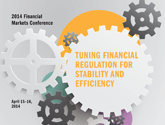Evergreen Hotel and Conference Center
Stone Mountain, GA
Overview
 In the wake of the financial crisis and Great Recession, the United States and other large industrial nations enacted sweeping regulatory changes. In mid-April, the Federal Reserve Bank of Atlanta convened leading thinkers in finance and economics in Stone Mountain, Georgia, to explore the implications of new regulations and whether more regulated financial markets produce greater financial and macroeconomic stability.
In the wake of the financial crisis and Great Recession, the United States and other large industrial nations enacted sweeping regulatory changes. In mid-April, the Federal Reserve Bank of Atlanta convened leading thinkers in finance and economics in Stone Mountain, Georgia, to explore the implications of new regulations and whether more regulated financial markets produce greater financial and macroeconomic stability.
As one might expect regarding such complex issues, straightforward solutions are elusive and opinions vary. The Atlanta Fed's 2014 Financial Markets Conference—Tuning Financial Regulation for Stability and Efficiency—examined numerous proposals and actions intended to promote recovery and reduce the risk of future crises.
Yellen discusses Fed's work to augment Basel banking rules
Federal Reserve Chair Janet Yellen opened the conference via video. She said the Fed is studying ways to augment liquidity standards for global banking firms that were formulated by an international body of bank supervisors who meet in Basel, Switzerland.
While she believes the new liquidity standards are important steps forward, Yellen also said, "They do not fully address the financial stability concerns associated with short-term wholesale funding." For example, Yellen pointed out that the Basel III standards do not apply to "shadow banks," nonbank financial firms that are also involved in liquidity creation. "Federal Reserve staff are actively considering additional measures that could address these and other residual risks in the short-term wholesale funding markets," she said.
Yellen added that the Fed is carefully considering the trade-offs associated with tighter liquidity regulation. Such cost-benefit analysis does not lend itself to clear-cut answers, she noted. But a study by the Basel Committee on Banking Supervision suggests that stronger risk-based capital and liquidity requirements would, on net, produce economic benefits, Yellen said.
Are less active markets necessarily safer?
After the Fed Chair set the stage, four panel discussions explored timely policy questions. The first examined whether less active financial markets are inherently safer. Joseph Stiglitz, a Nobel Prize–winning economist and professor at Columbia University, argued that more active markets are not necessarily better and gave two examples. First, he argued that restrictions on cross-border capital flows can help reduce financial and economic volatility. Second, he advocated limits on practices such as high-frequency trading, which involves using sophisticated technological tools to trade securities rapidly. The practice has become controversial, as some observers believe it gives those traders an unfair market advantage.
"If we create more opportunities for Wall Street to be more like Las Vegas, is society really better off?" Stiglitz said. "Most of us think probably not."
That said, the major problem is not high-frequency trading, commented Rishi Narang, founder of a firm that focuses on the practice. Narang displayed statistics showing that high-frequency trading does not increase market volatility, as some critics claim. Most high-frequency traders also do not oppose sensible regulation of their practices, Narang said. But he added that new regulation can favor industry players who hire the most effective lobbyists.
Will liquidity regulation lead to a safer, more efficient financial system?
In the conference's second policy discussion, Franklin Allen, Wharton School professor of finance and economics, began with a discussion of how little is known about the effects of regulating liquidity. His conclusion was, "With capital regulation there is a huge literature but little agreement on the optimal level of requirements, but with liquidity regulation we do not even know what to argue about."
Mark Van Der Weide, a deputy director at the Federal Reserve Board of Governors, reinforced the points made by Chair Yellen about how the new standards will strengthen the financial condition of individual banks.
Simon Davis, a senior regulatory specialist at the Royal Bank of Scotland, raised the questions, "Does one size fit all?" and "Is there more to liquidity risk?"
Debating the effectiveness of QE
A discussion of the Fed's large-scale asset purchases, also known as quantitative easing or QE, produced opposing views. Allan H. Meltzer of Carnegie Mellon University declared QE a mistake. The policy has not materially helped the economy, and it is unclear how the Fed will dispose of the more than $2 trillion that QE has added to the central bank's balance sheet, Meltzer said.
David Zervos, the chief market strategist for the investment bank Jefferies LLC, disagreed. He said QE helped prevent the widespread retrenchment and total risk aversion—"hoarding behavior"—that defined the Great Depression and the 1990s in Japan. He added that house prices are up, unemployment is down, and wealth, though not distributed equally, is at near-record levels. "That's why I'm an unabashed believer in QE," Zervos said.
He acknowledged that, like Meltzer, he is unsure how the markets and economy will wean off of what he described as the "antidepressant" that is QE.
There's more information, but we still don't know enough
The conference's final policy session focused on whether more information—available to regulators and market participants—will help avert future financial crises. There has been significant improvement in the data available to supervisors, according to both Andreas Lehnert, a deputy director at the Fed's Board, and Patricia Mosser, a deputy director at the U.S. Treasury Department's Office of Financial Research. However, both speakers noted significant gaps, and other problems remain with the available data.
University of North Carolina Professor Robert Bushman observed that financial statements are senior management's depiction of a firm's economic conditions, and these managers have an incentive to use their accounting discretion to further their own personal interests.


